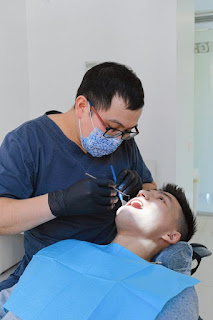What You Need To Know- Problems From a Chipped Tooth

You finished your cold beverage and crunched down on a piece of hard food when you suddenly realize there is something hard still in your mouth.
A chipped tooth is common between adults and children. It’s actually quite easy to chip a tooth in spite of the fact that enamel is the hardest, most mineralized tissue of the body. Besides biting on something hard or falling and hitting your mouth at the right angle, dental conditions like tooth decay or night teeth grinding can also cause a tooth to chip. If you’ve recently chipped a tooth, it’s important to know about potential problems with a chipped tooth.
What You Need To Know- Problems From a Chipped Tooth
What Happens If You Don’t Repair A Chipped Tooth?
A chipped tooth is not a big deal, especially if it’s a molar that no one can see. Smaller chips are not problematic unless they are sharp, they could possibly cut your mouth. If your chip is enough, it could end up with serious problems such as hot/cold sensitivity, bad breath, and even infected roots.
Deep chips can impact the root of the tooth, leading to potential infections or toothaches.
Deep chips can cause tooth decay resulting in insensitivity and bad breath.
Sharp edges can cut your cheeks, tongue, and gums.
When Do You Need To Repair a Chipped Tooth?
You should always visit the dentist when you’re facing a chipped tooth. For minor chips, you typically won’t need a major repair. More often than not, the dentist can just file the chipped tooth or fill it so it looks normal again. More significant cracks can require more extensive dental work. If a chip is significant enough, it can damage the pulp i.e. inside the tooth.
Damage to the pulp can be extremely painful and, if untreated, can become infected. You could be in for more extensive dental work.
How Does Your Dentist Fix a Damaged Tooth?
The dentist may only need to smooth the rough edges or fill with a dermal filling that matches your tooth. Chips that don’t damage the root or pulp may require a cap or crown to protect the tooth from future infections. In these situations where the root is damaged, you may first need a root canal before a crown is placed over the tooth.
How To Prevent a Chipped Tooth?
Maintaining good oral hygiene is the first step in preventing a chipped tooth. Making sure you’ve no cavities or tooth decay can help keep your tooth enamel strong. Your dentist can also help fit you for a mouthguard if you play sports. Protective gear can help save teeth from sustaining injury. If you’ve habits of biting your nails or chewing on your pen cap, you may want to switch to something a little less prone to accidents, like squeezing a stress ball.
You should try to avoid hard candies and chewing ice. We understand hard candy here and there is a nice treat. If you can’t resist the sweet tooth, avoid the temptation to bite and break the candy. Sometimes it’s not easy to prevent chipping a tooth. With good oral hygiene, making a few changes to your nervous habits, and even diet, you can help keep your teeth strong and chip-free.
If you have a chipped tooth and need an evaluation of the damage, connect with us and you’ll get many treatment options.
Source URL: http://gentledental.co.nz/services/emergencies/

Comments
Post a Comment